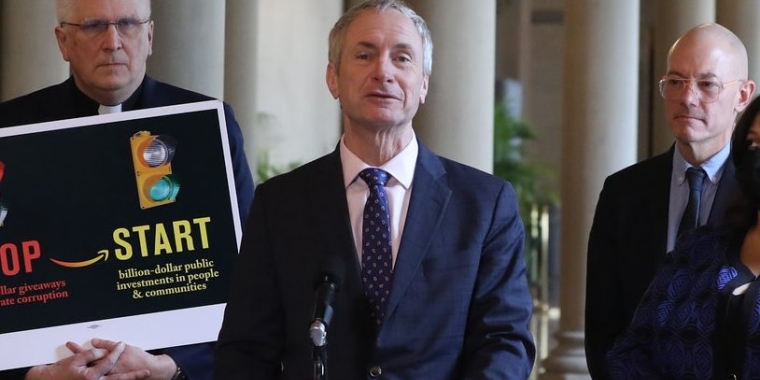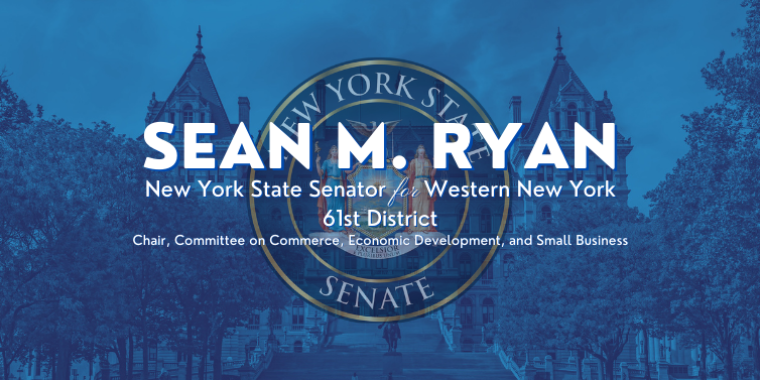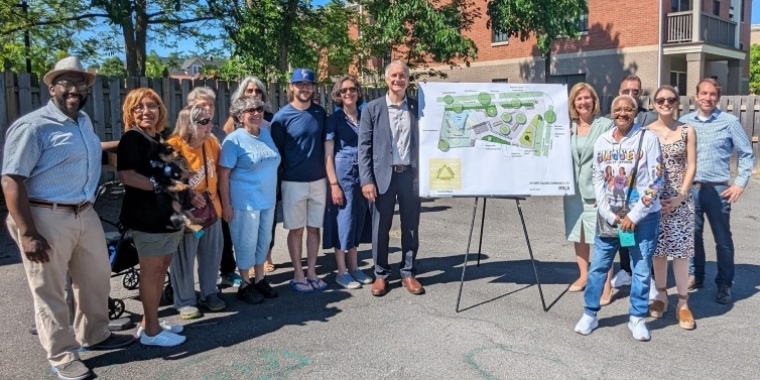
State Sen. Sean Ryan talks affordable housing (The Capitol Pressroom)

Audio:
https://capitolpressroom.org/2024/02/13/state-sen-sean-ryan-talks-affordable-housing/
Transcript:
David Lombardo
Democrats in the state legislature said thanks but no thanks to Governor Kathy Hochul's housing creation plan in 2023. And while the state's chief executive is back at it with a new effort to expand the state's housing stock, we want to turn our attention to what the legislature is kicking around. And to do that we're joined in the studio by State Senator Sean Ryan, a Buffalo area Democrat who recently unveiled a housing vision for his community. Welcome back to the Capitol Pressroom, Senator.
Senator Sean Ryan
It's great to be here today talking about this important issue.
David Lombardo
Your plan is supposed to address a lack of high-quality affordable housing in the Buffalo area. How bad is the problem there and is it solely an issue for renters? Or are there prospective homeowners who are feeling the pinch too?
Senator Sean Ryan
Yeah, it's all sectors of the housing economy. You know, when I often talk about Buffalo, I know that they're similar markets in Rochester, Syracuse, Albany, and Utica. So what we're really trying to do, David, is come up with a more regional approach to housing.
For years, the approach was really based on what was going on in New York City, and then we'll develop housing programs for the boroughs, and that they should be good for upstate too. But what we're finding is those programs really don't help upstate at all. Someone like Zillow will say "Buffalo and Rochester have hot housing markets," but you could look at it a different way. Time Magazine recently put out, of the 100 largest cities with the worst supply, Rochester and Buffalo were one and two. So, this hot housing market is often just because there has been a lack of houses built in these communities in the last generation, while at the same time, the state has been sponsoring demolition programs.
So, for a while we were really concentrating on demolitions. Then our population starts inching up and we realized maybe we went a little too far on the demolitions, and now we have a supply problem. Often people say, "Oh, let's wait for the market -- the market will solve this." The market's never really never solved housing problems in America; the post war housing boom was all government subsidized. So we just need to look at a more regional approach to housing.
David Lombardo
Sticking with that idea of government subsidies, a component of your vision for Buffalo's housing problem is to have the state subsidize one- and two-family homes that would then be sold to low-to-moderate income New Yorkers. Why is that a good use of the state's resources?
Senator Sean Ryan
Well, we're already spending about the same amount of money to build an apartment in Buffalo that's for affordable rent. So, the [Department of Homes and Community Renewal], the state agency that does housing, is spending a comparable amount to build an apartment in a large building. Meanwhile, a place like Buffalo has 13,000 vacant residential lots. A better use of that money would be instead of congregating people into one apartment building in a residential neighborhood, instead of building 20 units, let's spread it out and build 20 houses -- allow people to realize equity growth, to bring lower-income people into that the housing market. There's a big mismatch throughout the state, but two-thirds of Buffalonians, their households earn less than $70,000 a year and the average selling price for a house in Buffalo is about a quarter million dollars. So that means two-thirds of the people who live in the city are shut out of the housing market.
David Lombardo
So, for a lot of people who are considering becoming homeowners the real barrier to entry is the initial cost. It's that initial 10-20% of the price. So are you envisioning the subsidies going toward down payments? Are they supposed to go towards construction costs? How do you envision the state's money being used?
Senator Sean Ryan
It would go straight into construction costs. So, we would come up with designs that are reflective of the various neighborhoods, and then the money would go right into subsidizing the construction cost. And then the builder would be taken out of the equation, and then we would sell that house to neighborhood people based on their income level. So, what they pay will be a sliding scale. And of course, the principal put in will be forgivable over a very long period of time to make sure that that money is going to benefit the whole community and not just the buyer of the house.
David Lombardo
Would these then be essentially low income neighborhoods, or would you envision people who don't need subsidies purchasing homes, and so the communities can be more integrated?
Senator Sean Ryan
Well, we would look at it two ways: So, we want to solve the housing problem, but we also want to solve Buffalo's vacant lot problem. We want to spread it around. So, every councilmanic district, there's vacancies, but most of the vacant lots are more concentrated in the low income parts of the city. So, you will be putting new houses on the market in places of the city where there really is no private investment.
And what that will do is -- it rolls right into step two, which is there's not enough apartments available. Part of the reason there's not apartments available is because people who are in that $70,000 category, they can't get out of their apartments to go into a house. So, if we get the market moving and people actually moving from apartments into houses, that will then help with the supply problem on the apartment side.
David Lombardo
Typically, when the state begins investing in any sort of project, it means that there are certain labor requirements attached to those projects, requirements that sometimes can increase the cost of those projects. So, are you concerned at all about the subsidies basically artificially inflating the costs of these projects? Or could there be exceptions to things like project labor agreements, because of how much money might be spent or other ways you envision this program being implemented?
Senator Sean Ryan
We're definitely going to work it out, but we want this to be a program that helps the whole economy. In order to help the whole economy, we want to be able to hire local workforce. Local contractors. If possible, local union members. We're not going to limit it in any way, but we want to make it so we can get housing onto the market quickly. We don't do a lot of housing starts in Erie County, so a program like this would be very big for Buffalo.
And it's also transferable to other areas of the state, but we need to prove we can do it. But it's really just a mindset change from DHCR, which is, if you have some property in Brooklyn, they're going to pay you and subsidize you to put as many units as possible on the one plot of land. But that equation doesn't really help us rebuild our neighborhoods in any way. Imagine a block with 30 vacant lots, and you pick one corner lot and put 30 units on it. The neighborhood's not going to be happy about that; they prefer to have it spread out. It doesn't build equity with homeowners; you're still creating an apartment class. And you're really not getting a big bang into the local tax base. So, we need to do it differently. We're spending a lot of money already, and we just want to redirect how that money is currently being spent.
David Lombardo
So you're not looking for additional funds? You're just looking for flexibility with existing revenue?
Senator Sean Ryan
Yeah, over the last few years, we put a multi-billion dollar budget together for HCR and we want them to create programs that really reflect the regional needs of New York State.
David Lombardo
So, in addition to building new housing, you also want to make funds available to improve conditions in 4,000 affordable rental units in Buffalo, Albany, Rochester, and Syracuse. Why should the state get into that business as opposed to, say, holding delinquent property owners accountable either with tougher code enforcement or maybe fiscal penalties?
Senator Sean Ryan
I guess you need it all. But but here's the reality of the upstate housing market: People of very limited means own two- and three-family houses. They often live in them. And we find that there's people who own these doubles and triples who can't afford to do basic upkeep and repairs. Over the years, that all adds up. And so you meet people who will tell you, "well I have an upstairs apartment, but I can't rent it because the furnace went six years ago and I don't have the money to repair it."
So, it's a it's a bit of a double-edged sword, right? You want local community people owning your housing, but more and more the people who are owning them are on fixed incomes and in retirement. We don't want them to have to sell their houses, because we're discovering who's buying houses in the upstate market now are often people who are not from upstate; often it's international money coming in. And if you think it's hard to deal with an undercapitalized, elderly landlord, wait until you meet an owner from the United Arab Emirates who buy 75 houses on auction. That is going from the frying pan to the fire.
So, we want to make these investments into what I call "church lady housing." Someone who was a worked as in a job with, say, the City of Buffalo; they retired, they own a double, their husband passed away, and we want to get those units back online. And we're viewing it as, "How do we get more units online quickly?" It takes a long time to build a brand new unit, but it takes a lot less time to repair a unit that's sitting fallow now. We estimated for $75,000 -- we're not talking big, gut rehabs, we're talking making sure the kitchen's working making sure that heat's working, fixing the roof, fixing the pipes -- that we could get thousands of units back online quickly. Because, remember, what we're trying to do is increase supply. And the quickest way to increase supply is to take units that are not being utilized and get them back on the market.
David Lombardo
As part of that program, would you weed out applicants so they only fit that generic bill that you just described? Or would potential owners with the means be allowed to tap into the state resources as well?
Senator Sean Ryan
We would concentrate on the owners who can't afford it. So, if Jared Kushner owns houses in Buffalo, he wouldn't be eligible for this program. We found in a lot of the upstate cities that apartments that were really viable in the '80s, by the '90s they started getting rundown, and by the turn of the century, they were somewhat unlivable. But the owner is still living in the first floor, they just don't have the money to fix the rest of it. And my first impulse on this was, "Well, we should punitively go after these people to get them out of ownership of these houses." But then I saw the new people who are coming in to buy the houses, and it turns out that if you go to housing court and look at violations, there's a lot less violations if the house is owned by a community member, and there's a lot more violations if the house is owned by an outsider who bought a pretty lousy apartment and never expected or anticipated putting a dollar into it. We really want to put a focus on taking people who are currently in our community, who are good community members, helping them get their units back online.
David Lombardo
What strings, if any, do you envision attaching to this program if a landlord or property owner does decide they want to access these funds to make improvements to their properties?
Senator Sean Ryan
It's two strings. The first is, at the end of it your apartment unit has to be the federal quality housing standards, which is the Section 8 standard. And the second is, you have to agree to rent it for an affordable price for a period of time. So, it's not like we're going to put money into a landlord's pocket and then we're going to suddenly double the rent. That rent has to stay at an affordable level for 10-20 years. Once again, in a lot of the communities where these apartments are located, the rents are pretty low to start with, but we're not going to make it so you can become enriched and then suddenly start charging more rent. You're going to enter into a regulated system where the state is going to help you get the unit back online, you're going to agree to charge a set rent for a period of years to make sure it maintains its affordability, but then the rest of the community is really the winner here, because we then get movement in our housing market. We get less people leaving apartments because they're in bad shape. We spend less time in housing court trying to get people to make repairs. And then we can move people from apartments into the new builds we're going to be building.
David Lombardo
For those property owners who may have the resources, your colleague State Senator James Skoufis has a bill that would essentially let local municipalities say, "Work needs to get done on this property. We're going to do it, we'll just bill you for it." What do you think of pursuing that avenue?
Senator Sean Ryan
That's a great avenue. We have a product like that already, that city courts can order repairs made, and then the contractor has a lien against the property and can sell it at auction if they don't pay the contractor. I think the Senator Skoufis bill is actually a little more user friendly -- you don't have to go through the court system -- but I think that's a good idea. We can no longer allow absentee investors to come into our community with only one goal -- that's extracting a lot of profit -- that may be just leaving a carcass of the building after they've extracted the profit. So, code enforcement, forcing repairs, but also investment with undercapitalized landlords is what's gonna help get us a way better apartment market.
David Lombardo
Sticking with the issue of affordability and people who are already in homes, you have legislation that's designed to impact energy bills of consumers, because that's a major problem if people are trying to figure out how do I pay the mortgage versus the utility bill? What do you think that can be done in this area?
Senator Sean Ryan
The state has a lot of programs right now to help people insulate their homes, but they're often underutilized because they're super complicated. You have to get a lot of estimates, and you have to put your money up front. So, we're finding the consumer is reluctant to use those programs, especially if you don't have a lot of disposable income, if you're closer to the lower side of the income scale.
So, we've been talking to some of the local utilities and doing analysis of houses. We are proposing that, through the Public Service Commission, that there become a mandate that utilities start doing the installation. So, it takes the consumer choice out of it, it takes a lot of the confusion out of it, and you could almost imagine it like, "I'm here from the electric company. We're here to replace your meter." You don't say to the electric company, "Well, how much is that going to be? Do I need three estimates?" Instead, the utility comes into your house and goes through a formulaic process of doing the basic insulation.
We think that is so good on many levels. The first level is: low-income tenants often get evicted, or they have to move, because they can't afford the rent and the utilities together. You rent an apartment in May, everything looks good. But when your heating bill comes in December, you realize your heating bill's higher than your rent. And after a few months, often, if you pay the heat, you can't pay the rent; if you pay the rent, you can't pay the heat. We have to break this cycle, and we're going to do that by insulating, [at] utility-scale, lots of houses throughout New York State.
This will help us keep money in people's pockets, but it will also help with the Climate and Community Protection Act. Right now, we're barreling really quickly into an electric environment. But if somebody has a very old house that hasn't been insulated, you're just going to switch them from paying way too much than they should for their gas bill to paying way too much for the electric bill. So conservation has to be part of it. And it has that great ripple effect, then, of saving people money, but also allowing people to live in comfort. And we would hate to get to the end of the transference from carbon to non-carbon and to have poor people all over upstate still living in uninsulated, drafty, expensive houses. It's a lot cheaper to insulate houses than it is to build new windmills, and that's what we endeavor to do.
David Lombardo
Going back to the idea of increasing the housing stock, last year Governor Hochul launched her so-called pro-housing initiative, which has a community certify as pro-housing by either committing to removing local barriers to building new housing or simply hitting new home growth goals set by the state, which then gives them priority for accessing discretionary funds, and may in the future be required, if the governor gets her way, to access more than $650 million in funds. What do you think of this effort, including making it a requirement for tapping into state funds in the future?
Senator Sean Ryan
It's one tool in the toolbox to get more housing in New York State. I think the plan that I'm putting together really is complementary to the governor's plan. I view the governor's plan similar to when they changed DWI and drinking age laws, where the federal government said, "Unless you raise the drinking age to 21, you can't access all this Department of Transportation funding" and it got people and states to fall in line rather quickly. So, I think it's one tool in the toolbox, but we have to put a lot of other tools in the same toolbox.
David Lombardo
Last year, you were part of a Democratic working group that was assembled by the State Legislature to try to hammer out some sort of grand proposal on housing, and allegedly you guys were close to striking some sort of two-way deal, although I'm cynical about that since it never actually came up for a vote. But what would you say were the areas of focus for that effort, and does it have any life in 2024?
Senator Sean Ryan
I think that process showed us that you need a regional approach to housing. At the end of the process, most of the points that were agreed on were really five-borough focused; did not have an impact outside of New York City. Remembering that with a simple tax subsidy, people will build big buildings in New York City. The upstate economy is so different that a property tax subsidy is not going to get you to redo an apartment or to build a two-family house. So, we need to really look at that differently.
But I think that process also made a lot of my colleagues understand that there really are a lot of different housing markets in New York State. We realize that in New York City, very few tenants get evicted for not paying rent, and it's because they have a lot of programs designed to make it so tenants can receive emergency money to prevent homelessness. And we found out that those programs were not being applied throughout the upstate counties in the same way. [We] did some research, found out that throughout the upstate cities, nine out of 10 evictions were because people couldn't pay rent, and the amount in controversy was $1,200 on average. If those people go into the shelter system, it's going to cost at least $13,000.
We've been working on changes to the social services law to make it so people are not evicted for just a small amount of money. Every year people are eligible for HEAP assistance, but we put some strings on the rental assistance laws where you could only be eligible every five years. We need to stop this churn of non-payment evictions throughout Upstate New York, and we're proposing changes to the social services law to make it so people who miss a month or two, have a medical emergency, get laid off from their jobs, suddenly don't become part of the unhoused. And this is more important because as our economy changes, and there's less supply of apartments -- people used to get evicted and within a week will be able to find a new place to live. That's not the same anymore, so it's really important to keep people in their houses.


